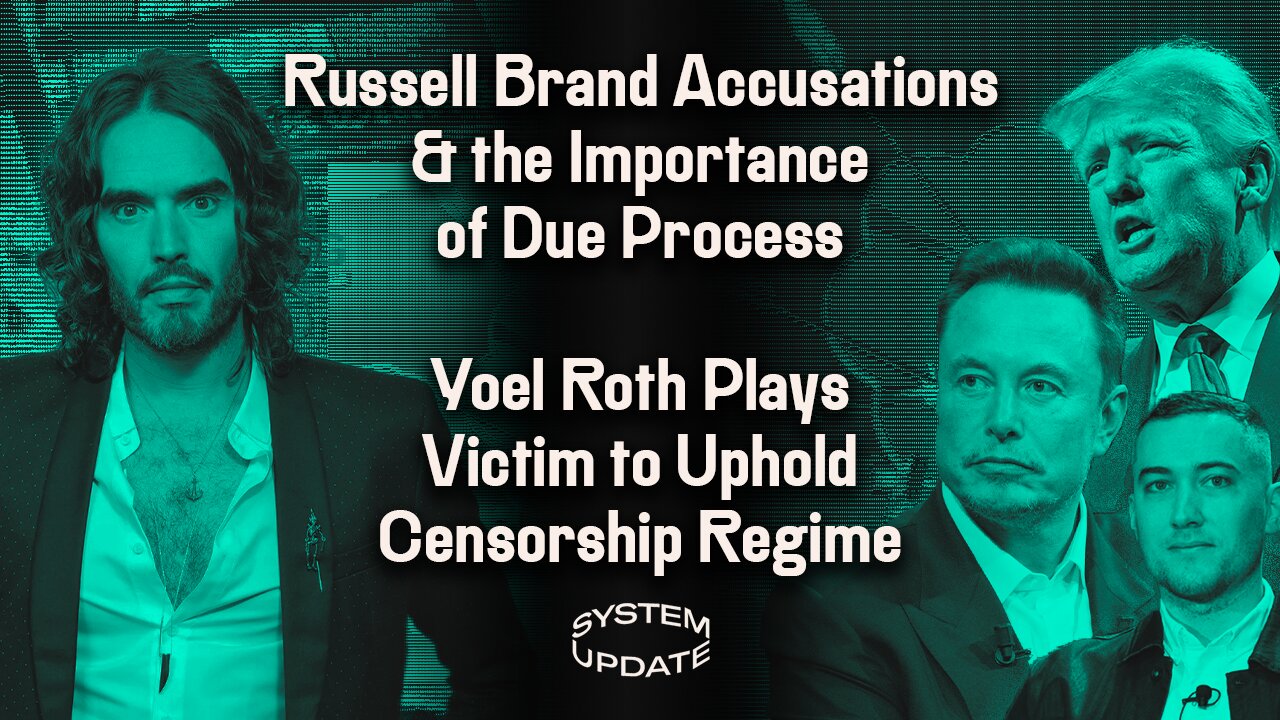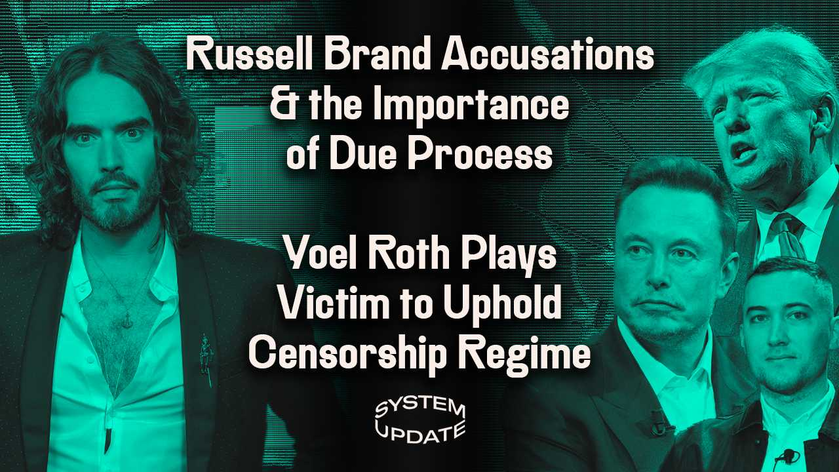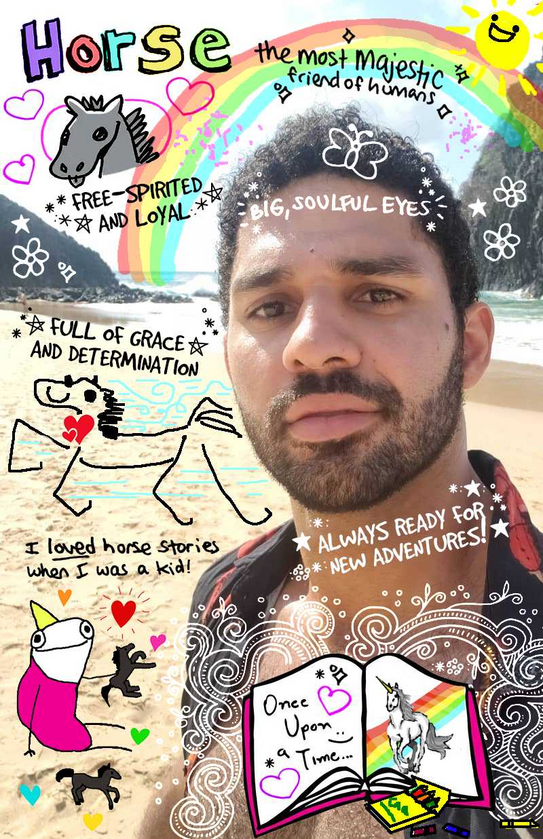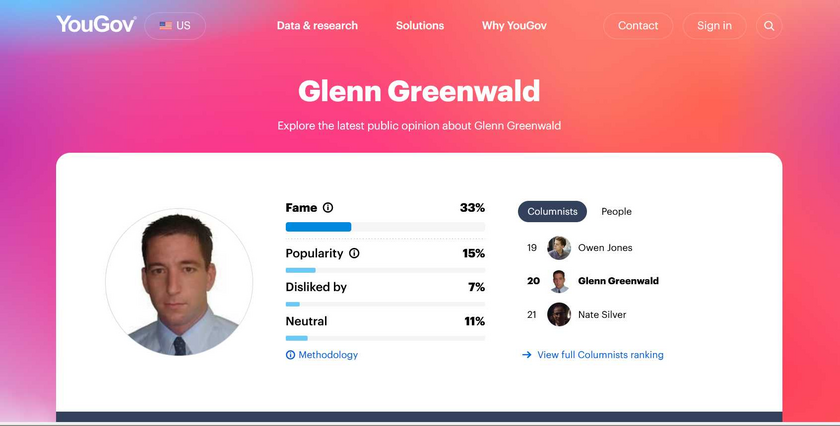Watch the full episode here:

It's Monday, September 18. Welcome to a new episode of System Update, our live nightly show that airs every Monday through Friday at 7 p.m. Eastern, exclusively here on Rumble, the free speech alternative to YouTube.
Tonight: The accusations against Russell Brand. The famed comedian, actor and political commentator stands accused by four different women, all of whom are anonymous, of various forms of sexual misconduct, including an allegation of rape from one of them. The year-long investigation that culminated in these accusations was conducted by a consortium of British media companies, including the newspaper Times of London, which is owned by the Murdoch family, as well as the television network Channel 4. All of the allegations concern alleged behavior he undertook from the period of 2006 to 2013 when Brand worked for Channel 4, as well as for the BBC. There are no allegations involving behavior after 2013. Prior to the publication of the Times article and the Channel 4 documentary, none of these women had ever filed a criminal complaint, and there are no indications that even with the publication of these accusations, they have done so yet.
Brand skyrocketed to cultural celebrity as a result of hosting numerous television programs, acting as the lead in several Hollywood studio films and being married for a short time to the pop star Katy Perry. He has always been political and was long associated with the British left, being a vocal supporter of the British socialist Jeremy Corbyn and identifying for a long time as a democratic socialist.
But over the last several years, Brand's politics has become less susceptible to being ideologically pigeonholed for many of the same reasons that's true of the independent journalists Matt Taibbi and myself. In particular, Brandt has developed a profound distrust of and deep contempt for the leading institutions of authority in the West, including the corporate media, the Western security state, neoliberal financial institutions, and the COVID pandemic.
One of his main targets became the pharmaceutical industry. He is an outspoken opponent of the U.S.-EU role in the war in Ukraine and has long crusaded for the freedom of Julian Assange and Edward Snowden. He vehemently denounces the union of state and corporate power to censor political speech on the Internet – views which are now bizarrely coded as being right-wing and thus provokes the greatest amount of animosity from establishment centers of power, particularly from corporate media outlets.
Until the last few years, Brand largely worked within mainstream media and mainstream culture, he has been extremely candid about the difficulties of his past, including the years he spent in substance abuse and sex addiction and generally living what he describes as a spiritually deprived lifestyle built around hedonism. He wrote a book on that and the recovery process in which he engaged to get out of that lifestyle. He has also now built one of the most influential and powerful platforms in independent political media. His daily Show on Rumble and the segments of it that he posts on YouTube are routinely watched by millions of people. And that's been true for several years.
The allegations against Brand obviously have the potential to destroy his reputation permanently. It is the biggest story in the UK, occupying the cover of every newspaper and tabloid and dominating news programs on television. It also flooded the American media as well. The allegations deserve to be taken seriously in the sense that they are likely to have massive ramifications on numerous levels. We'll take a look at the accusations themselves, what we know and do not know about what happened in these events. We will also examine the reaction to the story and the ways in which it is predictably instrumentalized. There are a lot of important lessons in all of this, and we will do our best to examine those lessons with the intent to highlight what we think are the more generalized insights this case offers.
Then: When Elon Musk purchased Twitter in October 2022, an extraordinary amount of transparency was brought to that company. In particular, we learned a great deal about the censorship regime that had taken hold of Twitter and the other Big Tech platforms, and especially the ongoing continuous aggressive pressure from the U.S. government to engage in that kind of censorship. One of the key figures in Twitter's censorship scheme was someone named Yoel Roth, who headed what the company called its Trust and Safety unit. Many of the disclosures from reporters who had access to the Twitter files to Twitter's internal corporate documents revealed that it was Roth who was at the center of many of the platform's most controversial censorship decisions, including but by no means only the ones involving restrictions on the political speech of the then sitting president, Donald Trump. Once Roth began speaking in public in an attempt to justify and rationalize what he had done, it was clear that he sounded like some extreme liberal elite caricature and that the censorship inclinations that drove him were based almost entirely on his ideological and political convictions, which, like so many of those similar to him, he mistook for objective truth, data and science.
Roth, after effectively disappearing for a good while, has returned today with an op-ed in The New York Times. Part of the op-ed is designed to recount his victimhood, and the threats and insults he received online, but its real point is to lament what he says is the weakening of the censorship regime he helped build and the growing backlash among Americans having to have their political discourse limited and policed by the wrath of the world.
I think, and most definitely hope, that he is right about this, that the public backlash is now making it more difficult for social media companies and their government allies to continue to degrade the Internet into one of the most potent weapons of thought control and propaganda ever created. It is definitely long past time for Americans to backlash against this sort of despotic control. We’ll examine Roth's warnings to determine whether some victories are finally emerging against the wannabe authoritarians who are increasingly fearful of allowing free political discourse to flourish because they know free speech results in their being exposed as chronic disinformation agents and then, ultimately, they're losing their stranglehold on power.
For now, welcome to a new episode of System Update, starting right now.

























